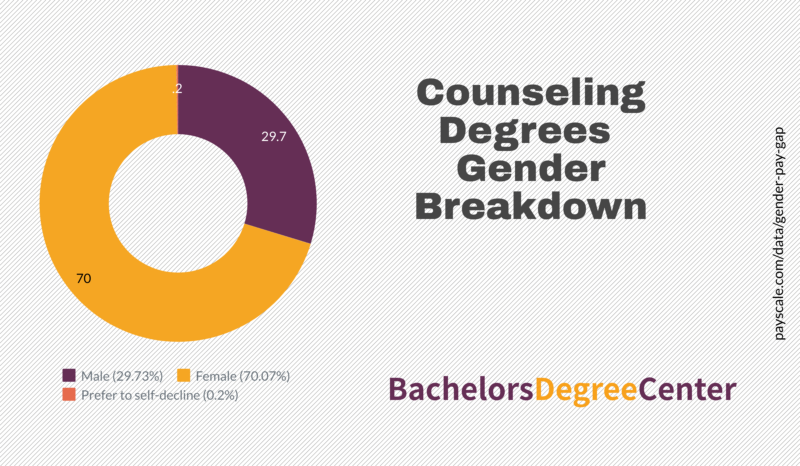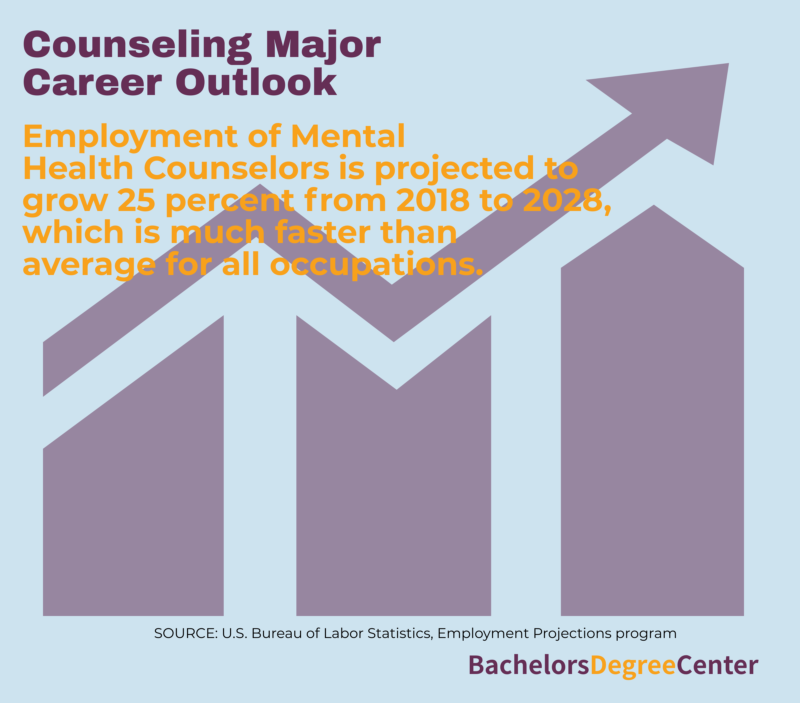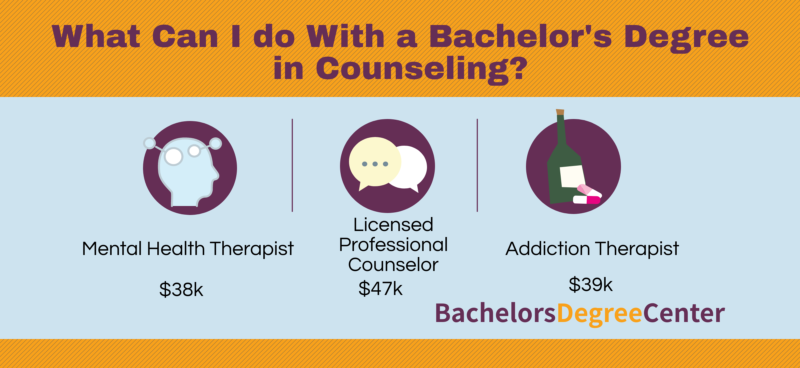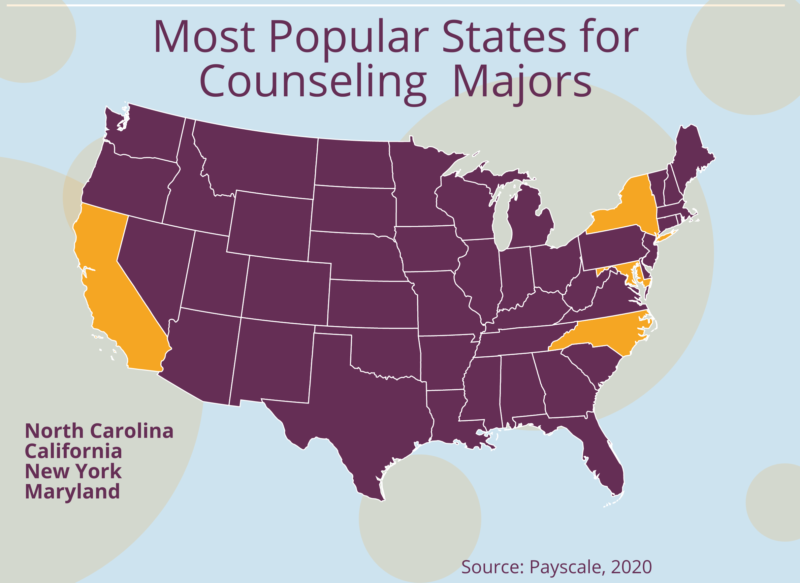If you are seriously considering enrolling in a program as a counseling major, it is important to complete one’s due diligence with regard to research and find the answers to these questions –
- What degree do I need to be a counselor?
- What undergraduate degree is best for counseling?
- Are there any types of counseling degrees that would meet my career goals and budget?
- Is there a best degree for counseling that is available at the baccalaureate level?
- What degree do I need to be a counselor in a school?
- Which counseling major is the most popular?
The above-noted questions are valid as there are quite a few different types of counseling degrees from which to choose when considering a career in counseling.

Accreditation for Counseling Programs
Accreditation is the standardized process that extensively reviews schools and academic programs offered by higher learning institutions. In the United States, accreditation is the process that offers students and parents an assurance that the education and degree promised by the school is the education a student receives after completing the program.
The process of accreditation is simply a procedure where third-party oversight agencies evaluate a school and its academic programs against a set of predetermined criteria. The objective of accreditation is to develop and improve the academic resources in the United States and to offer protection to the public by holding institutions of higher education to reasonable educational standards that deliver the quality of education promised.
In the U.S., the education system has two fundamental levels of accreditation applied to schools and academic programs — Regional Accreditation & Specialized Accreditation.
Regional Accreditation
The oldest of accreditation processes is that of regional accreditation. Regional accreditation is federally administered by CHEA — the Council for Higher Education Accreditation (CHEA).
The Council for Higher Education Accreditation covers the educational resources across the United States by dividing the country into six primary regions. Each region or zone is responsible for the accreditation duties for institutions of higher learning in its defined region. CHEA’s regional divisions are as follows -
- WASC Senior College & University Commission (WSCUC)
- Middle States Commission of Higher Education (MSCHE)
- The Higher Learning Commission (HLC)
- Southern Association of Colleges & Schools Commission on Colleges (SACSCOC)
- Northwest Commission on Colleges & Universities (NWCCU)
- New England Commission on Higher Education (NECHE)
Regional accreditation denotes if a school or program has met the stringent criteria established by the accreditation agency. Accreditation oversight agencies assess a school’s resources, a program’s curriculum as well as verify the credentials of educators and professors.
The second fundamental type of accreditation in the United States is specialized accreditation. Specialized accreditation is typically administered by sanctioned oversight agencies within specific industries.
As you consider which of the best colleges for counseling degrees may fit your career goals and budget, recognize that it is important that your chosen program have counseling program accreditation. There are two primary specialized accreditation awards in the field of counseling, which should be compared, as you consider your counseling degree options – CACREP vs APA – the American Psychological Association accredited programs.
Specialized Accreditation
The best counseling degree programs will typically hold accreditation from the Council for Accreditation of Counseling & Related Programs or the American Psychological Association. So, as you consider the many baccalaureate degree programs in counseling, be certain to answer these questions –
- Is CACREP Accreditation important?
- How does CACREP vs APA compare for the best schools for counseling?
- How do I locate the best college for counseling degrees that are accredited?
- How does counseling program accreditation work?
- What are CACREP standards, and how do they apply to accreditation?
- Where can I find the best counseling degree programs that will fit my budget?
The CACREP — the Council for Accreditation of Counseling & Related Education Programs
Headquartered in Alexandria, Virginia, The Council for Accreditation of Counseling & Related Educational Programs is recognized by the federal agency known as the Council for Higher Education. The CACREP is tasked with the responsibility of accrediting counseling degree programs – who must meet strict CACREP Standards to receive accreditation — provided to universities and colleges in the U.S. and across the globe.
CACREP Standards are recognized as the gold standard in terms of counseling degree programs.
The American Psychological Association (APA)
The American Psychological Association has a combined membership that exceeds 120,000 in the United States. Members of the APA include students, educators, researchers, and consultants, plus the clinicians working the front lines every day. The APA’s mission is to create and use psychology to help solve vital social issues and by preparing the discipline’s next leaders through its accreditation efforts.
The COAMFTE — the Commission on Accreditation for Marriage & Family Therapy Education
The COAMFTE – the Commission on Accreditation for Marriage and Family Therapy Education was founded in the mid 1970s and is the preeminent agency in the accreditation of academic degree programs related to marriage & family therapy education. The COAMFTE is a recognized accrediting agency by CHEA, the Association of Specialized & Professional Accreditors, and the U.S. Office of Education.
Types of Counseling Bachelor’s Degrees
The field of counseling offers many degree options to students who are serious considered earning a bachelor’s in counseling degree. In addition, the traditional routes to earning a bachelor’s in counseling degree on-campus, there are now many options that offer you ways to become a counselor online. Bachelor’s in counseling degree programs are now widely offered by many four-year institutions of higher education through their counseling degree online distance learning programs.

A counseling bachelor’s degree is a great option for those who wish to work towards their license, typically available when completing a master’s level program, but want to work in a counseling facility while earning their graduate degree.
There are various degree programs that will allow students to become a counselor online or on-campus if you prefer. Consider these online psychology counseling degree options that offer academic emphases as follows –
- Mental Health Counseling
- Marriage & Family Therapy
- School Counseling
- Substance Abuse Counseling
- Rehabilitation Counseling
Any of the above-mentioned counseling degree online program options are available from some of the finest universities as an online psychology counseling degree.
You should know what is expected of you before applying. Will you have to study full-time? What kind of coursework and practicum is involved? Is part-time an option? What kind of GPA do you need? Will this meet the educational requirements and licensure requirements for professional counseling? What counseling specialization is available? Specializations in a bachelor of science may include:
- clinical mental health counseling
- counseling psychology
- human development
- behavioral health
- career counseling
- group counseling
- abnormal psychology
- marriage and family therapist
- behavioral disorder
These specialization, according to the Bureau of Labor Statistics (BLS) can prepare you for private practice or human services positions. There are many career paths, such as rehabilitation counselors, where you can use your counseling skills. A related field is social sciences.
Certifications and Licenses for Counseling
Those who have been awarded a bachelors-level degree in counseling may supplement their education and degree by earning one of the man counselor certification credential options, which may make them more attractive to potential employers and offer more competitive compensation. There are various types of counseling certifications.
The variety of these types of counselor certifications run the gamut. The need for the certification will depend upon any relevant federal or state licensing laws. If you have yet to answer these questions, then it is likely your research into how to become a National Certified counselor remains incomplete –
- How do I learn how to get a counseling certification?
- Are there specific family counseling certificate programs available?
- How do I become a National Certified Counselor?
- Where can I find a list of specialty counseling certifications?
- Is the National Certified School Counselor certification worth the effort?
- How do I become a National Certified School Counselor?
The reality is that obtaining certification demonstrates a professional’s commitment to excellence in the profession. Certification also helps provide counselors with specific expertise in many different subspecialties.
There are many types of counseling certifications, or certifications available to those who hold a bachelor’s degree in counseling will vary by state. To learn how to get a counseling certification for your state, it is prudent to check with the state’s licensing board.
Counselor Certification Categories
School & Career Counselor
The Certified Career Counselor (CCC) credential is offered by the National Career Development Association (NCDA) and is considered the new standard in excellence for those trained to deliver counseling services with regard to careers. The CCC certification indicates that the holder is both specialized, trained, and experienced in terms of career training and development.
Substance Abuse
The NAADAC — the National Association of Alcoholism and Drug Abuse Counselors (NAADAC) offers six exams that lead to addiction counseling certifications.
The Certified Addiction Counselor (CAC) is a credential that is regarded as one of the highest credentials in the field of addictions.
The International Certification & Reciprocity Consortium (I.C. & R.C.) offers credentials and certifications that are recognized across the globe for those addiction specialists and professionals who are tasked with facilitating the prevention and use of substances, drugs, and alcohol. Among the credentials offered by the I.C. & R.C. include the following, which are administered by jurisdictions as set forth by state law –
- The CCJP – the Certified Criminal Justice Addictions Professional
- The PR – the Peer Recovery credential — credential — students typically use study guides offered by the I.C. & R.C.
- The ADC – the Alcohol & Drug Counselor credential – this three-hour exam requires the completion of 150 questions.
- The P.S. – the Prevention Specialist credential – certification is offered at the jurisdiction level.
- The C.S. – the Clinical Supervisor credential — students typically use study guides offered by the I.C. & R.C.
- The AADC – the Advanced Alcohol & Drug Counselor credential — this credential is administered by local boards and may vary by state.
Mental Health Counselor
The NBCC offers a counseling credential well-known in the industry that is the CCMHC – a Certified Clinical Mental Health Counselor (CCMHC) that requires certificate candidates to meet strict education, experience, and ethical mandates. The exam for this counseling credential is offered twice per year.
The NBCCH — the National Board for Certified Clinical Hypnotherapists (NBCCH), established in 1991, offer certifications to counseling professionals who wish to use hypnotherapy in their counseling sessions. The NBCCH offers six credentials, as follows –
- The National Board Certified Clinical Hypnotherapist in Public Service.
- The National Board Certified Clinical Hypnotherapist.
- The National Board Certified Clinical Diplomate in Clinical Hypnotherapy.
- The National Board Certified Clinical Diplomate in Clinical Hypnotherapy, in Public Service.
- The National Board Certified Clinical Fellow in Clinical Hypnotherapy.
- The National Board Certified Clinical Fellow in Clinical Hypnotherapy, in Public Service.
Marriage & Family Therapist
For those therapists who want to earn a marriage and family therapy license or credential, the American Association for Marriage & Family Therapy offers a clinical fellow membership. Clinical fellows join a network of more than 24,000 family and marriage therapists, tremendous relevant resources, and the opportunity to voice their opinion through AAMFT’s advocacy efforts.
Social Worker
The NASW – the National Association of Social Workers offers a variety of credentials for those in the counseling profession with career objectives in these specialties –
- Case Management – at the bachelor’s level, the NASW offers the C –SWCM credential — the Certified Social Work Case Manager certification.
- Hospice & Palliative Care – at the bachelor’s level, the NASW offers the CHP ‑S.W. credential — the Certified Hospice & Palliative Care Social Worker credential.
- Gerontology – at the bachelor’s level, the NASW offers the SW ‑G credential — the Social Worker in Gerontologycredential.
- Youth & Family – at the bachelor’s level, the NASW offers the C ‑CYFSW credential – the Certified Children, Youth, and Family Social Worker credential.
- Military — – at the bachelor’s level, the NASW offers the MVF — S.W. credential – the Military Service Members, Veterans, and their Families credential.
These NASW certifications are available to qualified social workers who are members of the National Association of Social Workers.
Many of the above-noted certifications are dictated and guided by state-level law, so students are encouraged to confirm the licensing and certification requirements for their particular state.
Careers in Counseling
The field of counseling is an ever-broadening field that offers tremendous opportunities to students who have an objective to become a counselor or to work in one of the associated non licensed counseling jobs that support mental health or counseling professionals. There are many types of therapy careers from which to choose as you discover how long does it take to become a counselor and how to become a mental health counselor.

As you continue your research and analysis of your potential career in the different types of therapy careers, make sure you learn –
- How to become a substance abuse counselor?
- What are the different types of counseling jobs available in my area of interest?
- How to become a licensed counselor?
- How long does it take to become a counselor?
- How to become a mental health counselor with an online degree?
- How to become a counselor without a degree by learning if there non licensed counseling jobs?
- What types of entry-level counseling positions are available with a bachelor’s degree?
- How to become a counselor without a degree while studying to complete your degree?
If you are serious about learning how to become a licensed counselor, then it is imperative that you understand which counseling jobs with bachelors in psychology may be of interest to you. Remember that earning a baccalaureate degree in counseling can open these options that lead to rewarding careers –
- A School Counselor
- A Marriage & Family Therapist
- A Mental Health Counselor
- A Rehabilitation or Substance Abuse Counselor
- A Grief Counselor
- A Child Pediatric Counselor, to name just a few.
If you are on a mission to understand how to become a substance abuse counselor, then it is important to focus on those programs the specialize in counseling programs with academic tracks dedicated to helping others rehabilitate from substance abuse issues.
Salaries of Counselors
One of the essential facets when considering any career is to think about the amount of salary or compensation one will receive in that career. Because the field of counseling offers degree holders a variety of career options, it is important to discover the answers to these important salary-related questions.
- What is the salary of a school counselor who holds a baccalaureate degree?
- How much do marriage counselors make an hour?
- What are the other available counselor salaries for more specialized counseling careers?
- How do school counselor salaries rise throughout one’s career?
- What is the difference between a non-certified and a certified counselor salary?
According to the Bureau of Labor Services’ statisticians, the careers of clinical, counseling, and school psychologists are categorized together for statistical purposes. As such, school counselor salaries and clinical counselor salaries are as follows –
- In 2023, there were more than 230,800 educational, guidance, and career counselors and advisors .
- In 2023, the median salary of a school counselor was $61,710 per year.
- The salary of a school counselor who is earning at the top of the scale (90%) is $73,520
School counselor salaries, along with clinical psychologists, will find the top-paying industries for these jobs as follows –
| Counseling Industries | Salaries of Counselors |
| Health Practitioner Offices | $96,930 per year |
| Company Management | $95,190 per year |
| Doctor’s Offices | $94,320 per year |
| Specialty w/out Substance Abuse/Psych. | $93,730 per year |
| Outpatient Care | $93,620 per year |
The top-paying states for counselor salaries are as follows –
| Top Paying States | Counselor Salaries |
| California | $108,350 per year |
| Oregon | $103,870 per year |
| New Jersey | $98,470 per year |
| District of Columbia | $95,500 per year |
| Hawaii | $94,550 per year |
Professional Organizations in Counseling

The counseling industry is constantly evolving and has many subspecialties from which students can choose.
Professional organizations are designed to support a specific industry (or a slice of an industry) by providing services and benefits to its members.
As such, it is imperative for counseling professionals to remain current with the industry by joining one of the many school psychologist association options in terms of professional organizations. Among the larger of the professional counselor organizations available are -
The American Psychological Association (APA)
The American Psychological Association is perhaps the largest and most influential of the counselor organizations. The American Psychological Association offers the typical benefits membership offers in a professional organization. These member benefits include –
- Job Boards.
- Professional Code of Ethics.
- An Annual Convention.
- Mentorship, education & accreditation services, to name a few.
The National Board for Certified Counselors (NBCC)
The National Board for Certified Counselors is another professional organization that seeks to be the preeminent certification body for counseling. As a professional organization, NBCC has industry-approved certification and credentials with its NCC – National Certified Counselor credential. Additionally, the National Board for Certified Counselors provides a state license directory to facilitate licensure information for any state. NBCC offers its members affordable liability through partnerships in the insurance industry.
The American Mental Health Counselors Association (AMHCA)
The American Mental Health Counselors Association is a professional organization for counselors who have earned a graduate-level degree, or higher, although the American Mental Health Counselors Association offers student memberships and associate membership to those in the counseling profession who support mental health counselors.
The AMHCA Code of Ethics is the gold standard for AMHCA members. Membership within the American Mental Health Counselors Association requires members to strictly align with the AMHCA Code of Ethics and standards.
The American College Counseling Association (ACA)
The ACCA — the American College Counseling Association (ACCA) is a division of the larger organization known as the American College Counseling Association. The American Counseling Association membership is available to students or working professionals in the fields of counseling, social work, and psychology. Additionally, those who supervise or educate counselors can also apply for the American Counseling Association membership.
The Counselors for Social Justice (CSJ)
The Counselors for Social Justice offers membership to those counselors who wish to promote social justice through the development of professional counselors. Counselors who are members of CSJ work with issues that include disability rights, healthcare for women, LGBT community rights, racism, and discrimination in general, among other issues.
The National Association of School Psychologists (NASP)
The NASP is one of the more popular of the school psychologist association options for school counselors. The NASP, as a school psychologist association, also offers specialized accreditation for professional development programs dedicated to school psychologists.
The School Social Worker Association (SSWA)
The School Social Worker Association offers a wide variety of membership benefits that include various levels of professional malpractice insurance, conferences, webinars, resources, and job boards.
Additionally, the field of counseling offers these professional organizations for a more specific slice of the counseling field – The Association for Creativity in Counseling and the Association of Guidance Counselors.
Related Rankings:
Best Bachelor’s in Counseling
Top Online Bachelor’s in Counseling
Fastest Online Bachelor’s in Counseling
